Women’s Day: A clarion call for women path-makers
Women’s Day is a great time to talk about the role of path-makers in our lives and also call on other women to share their views.
In the 1930s, Amelia Earhart became the first woman to fly across the Atlantic Ocean and stand up for not just the mutual support of other women pilots but also for the advancement of the aviation industry with 100 other licensed women pilots. Today, there are approximately 9,700 women pilots globally.
It was once a challenge for a woman to be considered for medical education. In 1847, Elizabeth Blackwell became the first woman to attend medical school in the US. Blackwell's inaugural thesis on typhoid fever was the first medical article published by a female student from the US. Dr Ann Preston founded Women’s Medical College of Pennsylvania and became the dean of the college in 1866, the first woman to hold this title.
Two decades later, Anandibai Gopalrao Joshi became the first Indian female physician to study and graduate with a degree in western medicine from this fine institution. These pioneers opened the doors for many women doctors who followed.
All it takes is one leader to inspire and illuminate a path for others to follow and accomplish great feats.
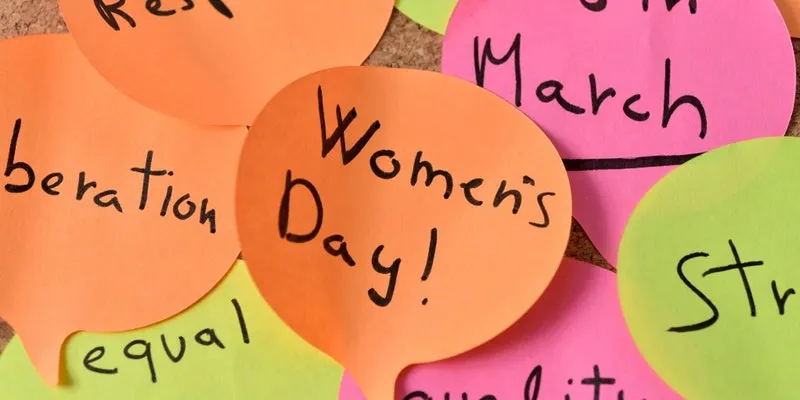
A level playing field
Women around the world have fought for equal rights in many aspects of life. In 1893, New Zealand became the first country to give women the right to vote on a national level. Australia followed through in 1902. On March 8, 1917, women textile workers in Petrograd, Russia, began a demonstration that covered the whole city. Despite the orders to the contrary, several women in Saint Petersburg, Russia, too left their work and went on strike on the same day for "Bread and Peace" – demanding the end of World War I, an end to food shortages, and an end of Czarism in Russia. A week later, Tsar Nicholas II abdicated his throne, and the provisional government granted women the right to vote. This is considered to be a focal point in the movement for women's rights.
Once the movement started, nations around the world joined in one after the other. Near the end of World War I, Canada, Russia, Germany, and Poland also recognised women's right to vote. Dutch women got the right in 1919, and American women in 1920. India, too granted women the right to vote just as the country gained independence in 1947. History is full of similar examples of achievements, inspiring revolutions.
All these women and many others have not just been pathbreakers but also “path-makers”.
The role model effect
Role models are an effective way of motivating individuals to set and achieve ambitious goals, especially for members of minority groups. They are often regarded as a remedy for inequality.
Role modeling is essential in terms of overcoming initial obstacles to access - even to believing and learning that a particular goal or objective is attainable. This goal may be preexisting or a new goal an individual had not considered pursuing before because it felt out of reach.
Observing a role model achieving a particular goal, under the right circumstances, may be enough to encourage individuals to believe that they, too, can attain that goal. Social psychological research concludes that role models are especially inspiring when their successes seem attainable.
This also helps to remove the stigma of failure.
An HBR report notes that people may never find that ‘one perfect role model’ for all their career aspirations. Instead, they should look for multiple role models in different areas for the skill sets they want to develop. Role models do not need to be outstanding to be effective. Everyone can be a role model for someone. Hence, having diverse management at the helms of the company provides an opportunity for different perspectives and a variety of role models.
Despite a reasonable proportion of women participation at entry-level, companies see huge attrition, especially from women in the middle and senior levels. This creates a vacuum as women starting their careers do not have sufficient access to women in leadership as role models. Conscious effort while hiring and sponsoring women at the workplace for promotions can create an environment conducive for women to grow.
The need for more such women path-makers in the world is crucial. Every woman has the opportunity to be a path-maker, no matter whatever their position. There is a great need for women to recognise and be conscious that they are path-makers and inspire others to fulfill their potential.
Women and the world of business
A 2020 report by WEF found that there is still a long way to go to achieve global gender parity in various fields. Women are, on average, heavily under-represented in most emerging professions. The 2020 Women on Boards Gender Diversity Index (GDI) noted that women now hold 20.4 percent of the board seats of Russell 3000 companies. The percentage of women in the 100 largest companies is 27.7 percent, while in the 1,000 smallest companies, it is 15.7 percent.
The median number of women on Indian boards doubled in the past five years, but they still form a small proportion of the total board members. A study of the Bloomberg data on the gender composition of boards of 91 companies of the BSE-100 index reveals the women constituted only 13.85 percent of the board, which is higher than the median 10 percent half a decade ago. There is still a significant need for greater representation.
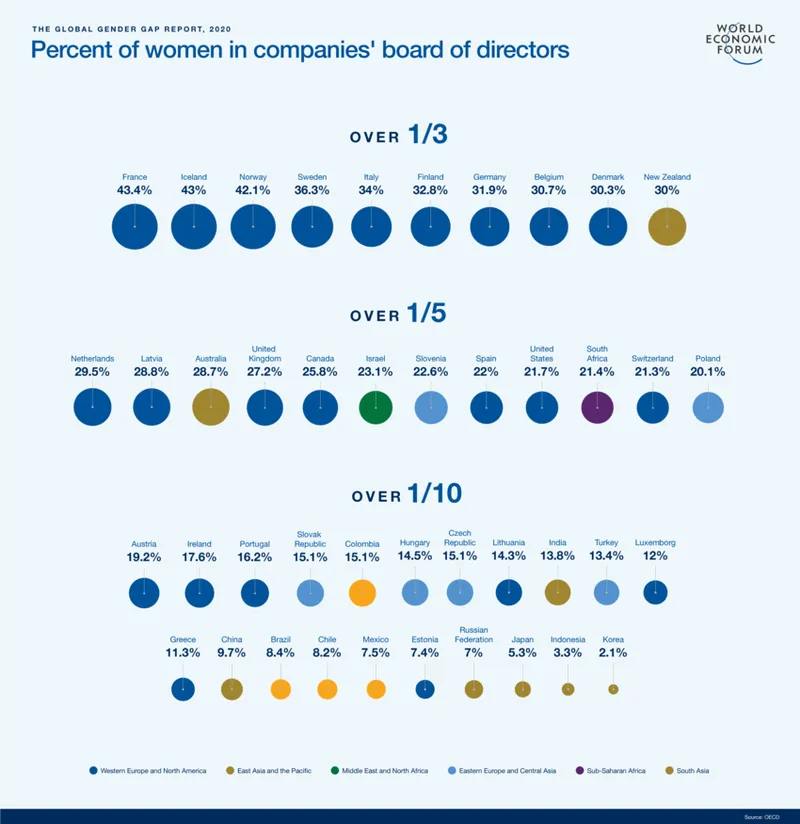
The venture capital industry has historically been a boys’ club. A recent All Raise report highlights women underrepresentation on both sides of the table as investors and as company founders. This underrepresentation is a problem even across the startup ecosystem, which relies on scalable companies to reach its potential.
However, there has been consistent progress in recent years. Globally, the ratio of female-founded startups had improved substantially since 2010, when they comprised 11.8 percent of the market. Globally, more than $46 billion was invested into startups with at least one female founder in 2018, more than doubling 2017’s value. Only $3 billion went to such startups in 2010, translating into a more than 15-fold increase over the past decade.
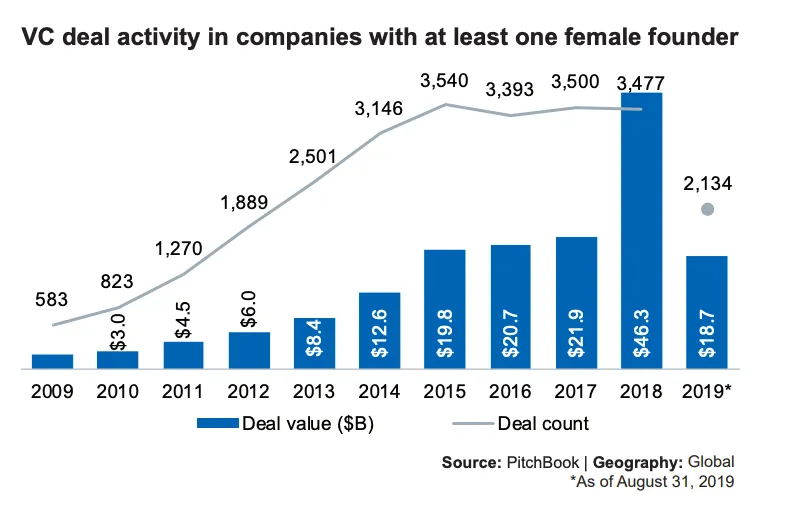
The gradual rise in female-founded startups can be traced to several factors, including market awareness of the gender imbalance, ease of doing business, entrepreneurial supporting factors, stronger mentorship networks for women, and more women entering the venture side of entrepreneurship.
Global venture capital investment in all-female founding teams hit $3.3 billion in 2019. However, this amount is minuscule and represents 2.8 percent of the total capital raised in the US startup ecosystem. In contrast, all-male founding teams raised more than 85 percent of all US venture capital dollars in 2019.
Awareness is driving a shift as funding for startups with a female founder or co-founder has increased across the globe. From 2009 to 2018, there has been an 8.1x increase in capital that has been invested in US companies with at least one female founder.
In India, there has been a slight increase in women’s tendency to save to start a business, increasing from 4.5 percent in 2016 to 7.3 percent in 2018. Despite the availability of several funding options, most early entrepreneurs find it challenging to raise funding in the early phase of their entrepreneurial journey. Globally, women entrepreneurs still need better support and better access to finance and networks.
Why is women’s participation essential?
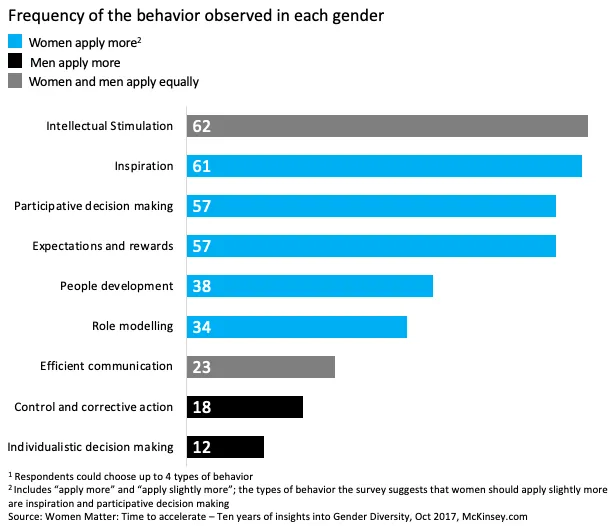
According to a report by Bain & Company, in the coming years, India will have the largest working-age population in the world. This demographic distribution, in combination with an increasingly educated population, has the potential to transform India's economic and social development.
Entrepreneurship among women will have significant effects on the nation's progress. It will boost the economy through job creation and also produce transformational social and personal outcomes for women.
It is imperative now more than ever to encourage and support our women in every way possible and create an ecosystem conducive to their growth.
Leaders speak about their experiences
The world of business is full of women leaders who have played vital roles and also made tangible and intangible contributions.

Vani Kola, MD of Kalaari Capital
I am very fortunate to have had role models at home who made my education and my personal aspirations a priority. As strong women of substance, they provided consistent encouragement in all my pursuits.
I also went to an all-girls high school, and the supportive early environment at home and school encouraged my notion of limitless possibilities, which was an essential anchoring for what was to come later.
Later, as I worked largely in environments where I was a single-digit percent, my capacity to compartmentalise and be immune to my minority status while also having the clarity and conviction to pursue long-term goals and objectives made it possible to embrace the philosophy of Ruth Bader Ginsberg, "I would like to be remembered as someone who used whatever talent she had to do her work to the very best of her ability."
Applying this principle every day is what helped me. Though I was the first in my extended family to go abroad and study, take up entrepreneurship, and then investing, I never saw these firsts in the context of being a path-maker. But as I have progressed in life both professionally and personally, I have realised that I have a responsibility to pass on whatever I have learnt and support others to create their own path.
A few of my thoughts on characteristics of a path-maker:
- Capacity to look for potential in others and help them realise it.
- Be generous in giving back time and mentoring because, without an abundance of giving by others, I wouldn't be where I am today.
- Always embrace your true self and be authentic without worrying about others.
- Expect more of yourself and those around you. Don’t compromise on perfection, set excellence and high moral standard as a bar.
- Setbacks are opportunities for new comebacks.
I am committed to help more women along the path of entrepreneurship and be path-makers in their own unique ways.
Kirthiga Reddy, Partner, SoftBank

When I was born, my grandfather didn't visit me in the hospital because I was a granddaughter, not a grandson. My father consoled my mother and said “If we ever have another child, I want another daughter. We will name her Kanchana.” It’s meaningful to me that he passed away on March 8, 2018. It's been two years since he passed but his spirit will live on.
Growing up, I moved cities in India every 3-4 years. I learnt to make the most of change. Like Vani, I was the first in my extended family to go abroad for my education. I am grateful for the opportunities I have had – as an engineer, product owner, operations, and sales leader, business executive and investor. I feel blessed to be surrounded by very talented, wonderful human beings – family, friends, colleagues, clients and partners -- women and men who have believed in me even more than I have believed in myself.
There is a great African proverb; “If you want to go quickly, go alone. If you want to go far, go together.” This has been a guiding principle in my life and my work as Partner at SoftBank.
A few of my thoughts on characteristics of a path-maker:
- In the journey of life, you will have people walking in front of you, besides you, and behind you. From those in front, seek inspiration. From those beside you, seek companionship. For those behind, seek to be a path-maker and lend a helping hand. This is true no matter what stage of life/career one is at.
- The way to grow your power is to give it away. Who can you sponsor? What introduction can you make? What insight can you share? You get the idea!
- Think about the three Ses:
- Stamina: This is a marathon, not a sprint.
- Sacrifice: Be intentional about trade-offs made for the successes you aspire to.
- Serendipity: Leave space for serendipity. It may be your highest ROI investment. E.g. I was introduced to the world of gaming by my younger daughter, Ariya. Comes in handy for investments in the gaming sector!
- Dream big. If your dreams do not scare you, you are not living up to your potential.
- Path-makers come in all forms. For a school essay on Tell Us About Someone Who Inspires You, my older daughter, Ashna, then 10 years old, wrote about finding her inspiration from within.
This Women’s Day, my wish is that we all find the inspiration within, dream big, create and step up to be path-makers.
We asked other accomplished leaders in the world of business to reflect on what a lasting legacy means to them and how one should go about looking for role models:
Zia Mody, Founder and Managing Partner, AZB & Partners

Zia Mody is one of India’s foremost corporate attorneys. She has a BA (Law) from Cambridge, an LLM from Harvard Law School, and is a member of the New York State Bar. She has been ranked amongst the Top 5 Most Powerful Businesswomen in India by Fortune India in 2015.
"What you experience as a child, on the dining table, shapes your view of the world and yourself. My mother is a Baha'i by religion, as are my brothers and me. And it is a religious diktat that men and women are equal. So, as children we were taught exactly that. Fiercely. Therefore, in my mind there was no difference and we were treated as such. Equal in opportunity. And with equal respect. I grew up believing that anyone who didn't think of me as an equal, just because I am a woman, simply didn't know better."
What does building a lasting legacy mean to you?
A lasting legacy is one where the institution you gave birth to survives and flourishes with new leaders who take it to the next level.
What were some of the pivotal decisions you took in your career?
To start a fledgling law firm with 12 lawyers, all fired with innocent enthusiasm and a passion to succeed.
What role can we play as a path-maker for other women?
To be a continuous mentor, to train others, male and female, to be strong mentors. To set the tone from the top that women matter. And they hold up half the sky. To get the institution to recognise the deep talent women bring to the table. And to nurture them through their life's journey and help them keep the passion.
Paroma Roy Chowdhury, Senior Director, Asia Communications and Public Affairs, SoftBank

Journalist turned communications professional, Paroma was Director & Country Head, Corporate Communications & Public Affairs of Google India, and was responsible for all media, industry, and community outreach in India. She has been part of the startup team of Indian School of Business, Hyderabad. Paroma loves good conversation, contemporary art, literature, music, and films and is an ardent champion of free expression.
What does building a lasting legacy mean to you?
Having a body of work and an attitude that inspires and encourages other women and builds a sense of solidarity and sisterhood.
What were some of the pivotal decisions you took in your career?
Risk taking works for me. I went into business journalism without reading a single business paper in my life; left my eight-year-old son behind with my super-supportive husband for a fellowship in the University of Cambridge and, subsequently, to jobs in different cities. Also, each of the industries I worked in—finance, tech, telecom and private equity—I knew nothing about before joining.
I am a firm believer in the adage, “Change is good”.
What role can we play as a path-maker for other women?
Leading by example and demonstrating resilience through words and action.
Shaheen Mistri, CEO, Teach For India

In 2008, Shaheen founded Teach For India, with a vision of providing an excellent education to all children across India through building a pipeline of leaders committed to ending educational inequity in India. Shaheen has been an Ashoka Fellow, a Global Leader for Tomorrow at the World Economic Forum, and an Asia Society 21 Leader. She is the author of ‘Redrawing India’ and the ‘Miss Muglee’ series of children’s books.
What does building a lasting legacy mean to you?
Building a lasting legacy means leaving a deep impression in the hearts and souls of people and shifting them closer to being the people they want to be. It's about making a tangible difference in people's lives - being a part of the ecosystem around them that believes in them, holds them to their highest and helps them discover what their greatest dreams are.
What were some of the pivotal decisions you took in your career?
- 1. Committing a lifetime to educational equity
- 2. Leaving a life in the US to come back to India knowing the scale and complexity of the problem here was immense.
- 3. Betting on leadership and the role it plays in shaping the nation.
What role can we play as a path-maker for other women?
The role I try and play is creating excellent educational opportunities for girls - I think that is the most fundamental step that will empower them to live lives that unleash their potential. I also think educating our boys is equally important - helping them understand and live with equality so that the women in their lives experience a different, more just reality.
Sairee Chahal, Founder and CEO, SHEROES

An Aspen Leadership Fellow, Sairee is also the convener of The SHEROES Summit – India’s largest women’s forum. With an M.Phil from JNU, and a PGDBM from IMT Ghaziabad, Sairee kickstarted her professional career while still in college before co-founding her first startup. She also worked at corporates like Heidrick and Struggles and CII.
What does building a lasting legacy mean to you?
Leveraging tech to solve deep-rooted problems in a creative, cool, consumable way. Making it scalable, inclusive, aspirational.
What were some of the pivotal decisions you took in your career?
I grew up in Muzaffarnagar – coming to Delhi alone for further studies was a big step for me – it pushed me to think autonomously. Plunging into entrepreneurship while still in college was another one – it pushed me to hustle, collaborate, leverage tech to build something from scratch. I bought my first car with my own money while still in college, and people knew me as the girl who got her own wheels. Starting SHEROES was the biggest decision – rethinking the internet for women, growing this conversation, building a superior product for women, from the ground-up. It’s been a phenomenal journey.
What role can we play as a path-maker for other women?
Be generous with support, appreciation, recognition and recommendations. Join or start your own community. Let’s face struggles, celebrate ambitions, together.
Kavita Mehta, Co-founder, Lore.online
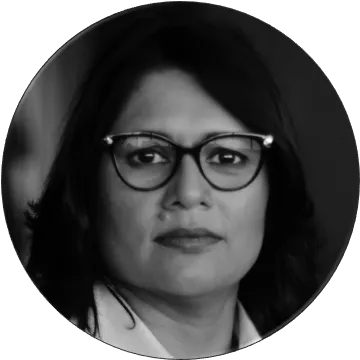
Kavita Mehta is a thought leader at the intersection of education, skill-building, technology and impact. Her 25-year career across financial services, digital media, and entrepreneurship is firmly grounded in her belief that education is a right, not a privilege.
What does building a lasting legacy mean to you?
From my perspective, building a lasting legacy includes helping others find a path or giving them confidence or supporting their ambitions when they feel helpless or unsure of their own abilities to execute. Starting with one person, one family, one community, one organisation to support human beings as they imagine a better life for themselves is something that truly gratifies me. And watching that story unfold over years is the ultimate reward. It’s why my entrepreneurial journey has been incredibly satisfying – I get to help my customers, my team, and a whole range of other stakeholders all while building economic value.
What were some of the pivotal decisions you took in your career?
I have had to summon the courage to remake myself many times over in my career. I left a leadership trainee role at GE Capital to restart my career on Wall Street; I was scared but kept my head down, learned, and thrived in ways I never expected. And during business school, when I wanted to gain international experience in Asia at a time when that was hard to do, I played the long game and eventually secured a first-of-its-kind internship in Mumbai. My classmates were uncomfortable with my non-traditional job search but once again, I remained true to myself. And when the startup I was working at imploded in 2000, my husband and I took the plunge to move to the West coast, without jobs but with a lot of heart and ambition. Taking calculated risks and having a support system are two of the most important tools required when pivoting.
What role can we play as a path-maker for other women?
Giving women a chance to return to work in ways that allow them to build a portfolio of wins is critical. Especially in India I find that women have lost their self-confidence after years of managing a household. Giving them a runway to pick up speed and take off is critical. But also holding them to standards that push them to reach is important; otherwise they languish somewhere in the middle.
Neha Motwani, Founder and CEO, Fitternity.com

Neha Motwani co-founded Fitternity in early 2014 as an extension of her own personal fitness journey. Prior to Fitternity, Neha has worked with Aon Hewitt in talent & organization consulting space and has over five years of experience across HR and risk consulting.
What does building a lasting legacy mean to you?
When I think about a lasting legacy, I think of the mission outliving the people who created it. As a co-founder of Fitternity where our mission is to empower people to live healthy and active lifestyles, I view the legacy being about not only creating a lasting impact with our current users, but also building a foundation that inspires people to live their fullest, healthiest, and happiest lives.
What were some of the pivotal decisions you took in your career?
As an entrepreneur, one often has many inputs in the decision-making process – whether it’s investor guidance or evaluating what your competitors are doing. However, what was pivotal to our success as a startup was the decision to truly tap into what our customers were telling us through data. Some of the most innovative products we have developed have stemmed from rigorous data-driven customer insights.
What role can we play as a path-maker for other women?
Women in leadership roles have a unique responsibility of having to forge a path while uplifting others along the journey. I believe there are three things that women in leadership roles should do
- Be authentic and embrace your unique self.
- Nurture future female leaders in your organisation.
- Give back and give time – always remember to pay it forward.
Priya Rajan, Managing Director, Silicon Valley Bank

As the Market Lead for India, MENA, and SEA, Priya provides international market entry advice and introductions to entrepreneurs and venture capital funds in emerging markets across borders. She was earlier Director of Early Stage Practice.
What does building a lasting legacy mean to you?
Lasting Legacy is a non-monetary, priceless measurement. Change that I can help be a part of that improves/eases the lives of people for the better. At work, striving my best to increase the probability of success of my tech startup founders; for friends, be the one they can count on when they need me; my kids, be the sense of inspiration that anything is indeed possible.
What were some of the pivotal decisions you took in your career?
One pivotal moment in my career was getting my Ivy League Executive MBA, my bucket list crossed off at the age of 37 as a mom of two kids with a full-time job. Though I had a lot of supporters there I had an equal number or more of people who questioned the decision too. Some of the questions — “ Do you really need this?” “You have a good job/stable one” “Work-life balance is great why mess it up” “What are you going to do with Ivy at this age? Have you thought about the ROI?” “How are you going to manage being a mom and give your kids the time they need?”
All of these questions only made my stronger to complete the MBA with a perfect GPA. Kids were fine (thanks to my spouse) and they let me switch my role from a back office function to what it is today and it made me a much happier and stronger person internally.
Lesson Learnt: Anything is possible. No one tells you what you can do or cannot. You set your limit which is limitless.
What role can we play as a path maker for other women?
Let’s pull each other up. Don’t get jealous or judgmental of another women’s journey but draw inspiration and be the source of support for her. Lend a hand to other women even if you don’t think she needs it, she just may be shy to ask. Be candid with your failures and success so others know it is not always as peachy as it seems now. The next generation is watching how we do what we do and we need to set the right example for our children — boys and girls.
This article was originally published on LinkedIn. Acknowledging Kstart Fellows Harshith Mallya and Nandhita Nandakumar who contributed to this article.
(Disclaimer: The views and opinions expressed in this article are those of the authors and do not necessarily reflect the views of YourStory.)
(Edited by Evelyn Ratnakumar)










